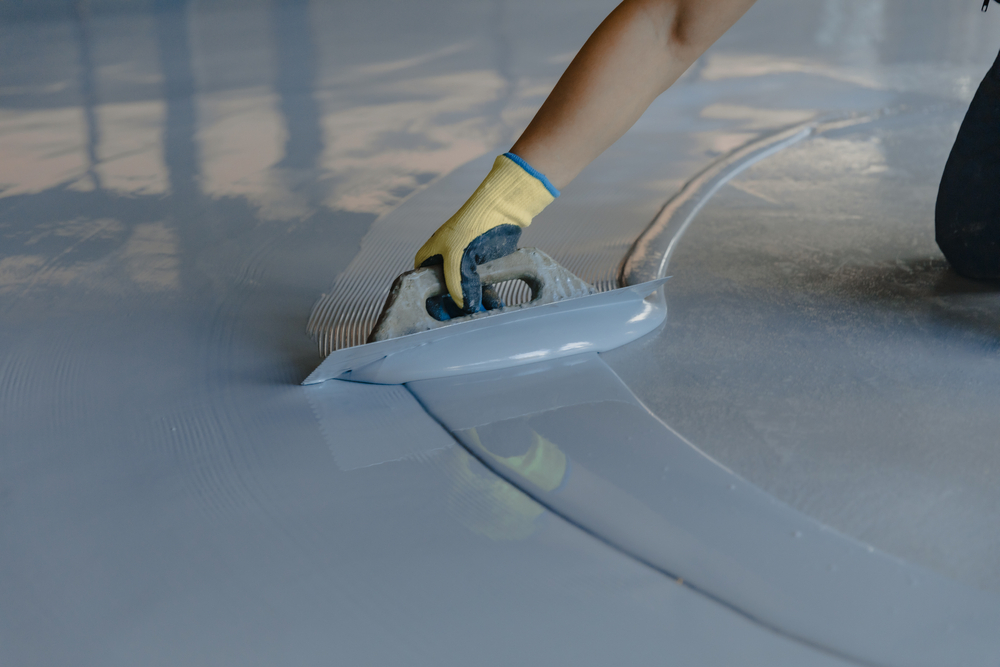Introduction
Have you ever found yourself staring at an epoxy-coated floor and wondering how to get rid of it? Whether planning a renovation, dealing with a botched epoxy job, or simply looking to update your space, this guide is your go-to resource. We’ll explore various methods, from epoxy floor removal machines to grinding epoxy off concrete. We’ll even delve into the cost of removing epoxy flooring. So grab a cup of coffee, and let’s dive in!
Why Remove Epoxy from Concrete?
Epoxy coatings are popular for concrete floors due to their durability and aesthetic appeal. However, they aren’t permanent fixtures. Over time, epoxy can yellow, crack, or go out of style. You might also switch to a different type of flooring.
The Lifespan of Epoxy Floors
Epoxy floors can last up to 20 years if well-maintained. However, they are not immune to wear and tear, especially in high-traffic areas. Over time, the coating may start to peel or develop cracks, making it less appealing and even hazardous.
The Aesthetics Factor
Trends change, and what was once the epitome of style can become outdated. If your epoxy floor has become an eyesore, it might be time for a change.
DIY or Professional Help?
This is the million-dollar question. Removing epoxy can be a DIY project, but it’s not for the faint of heart. You’ll need to decide whether to tackle it yourself or hire a professional. Either way, knowing the cost of removing epoxy flooring is crucial for budgeting.
Chemical Methods: How to Dissolve Cured Epoxy
Chemical methods are often the first choice for epoxy removal. They are generally easier to manage and require fewer specialized tools. However, they do come with their own set of challenges, primarily related to safety.
Acidic Solutions
Acids like sulfuric and muriatic can break down epoxy coatings. But remember, safety first! You’ll need rubber boots, acid-resistant gloves, and proper ventilation. Always read the manufacturer’s instructions and take necessary precautions.
Solvents: Epoxy Paint Remover
Acetone and paint thinners are your go-to solvents for this job. They require a bit of elbow grease and multiple applications but get the job done. Make sure to work in a well-ventilated area and keep flammable materials away.
Paint Strippers
Products containing methyl ethyl ketone (MEK) are particularly effective at breaking down epoxy. They are available in various forms, including gels and liquids, and can be applied with a brush or roller.
Mechanical Methods – Grinding Epoxy Off Concrete
If chemicals aren’t your thing, or if you’re dealing with an especially thick or stubborn epoxy coating, mechanical methods might be more up your alley.
Floor Grinders – Epoxy Floor Removal Machines
Renting a floor grinder is an efficient way to remove epoxy. These machines are not cheap, so make sure you really need one before taking the plunge. Floor grinders come with different types of abrasive surfaces, so choose one that’s appropriate for your specific epoxy type.
Steel Shot-Blast
This machine uses high-pressure and tiny steel balls to chip away at the epoxy. It’s a good option for larger areas but can be overkill for small spaces. Make sure to wear ear protection, as these machines can be quite loud.
Sandblasting
Sandblasting is another mechanical method for removing epoxy from concrete. It involves shooting sand particles at high speeds to chip away the epoxy. This method is effective but can be messy, so it’s best suited for outdoor projects.
Safety Measures
Whether you’re using chemicals or machinery, safety should be your top priority. Always wear protective gear, including a respirator, gloves, and eye protection. If you’re using chemicals, make sure the area is well-ventilated. For machinery, ear protection is a must.
Personal Protective Equipment (PPE)
Invest in quality PPE to protect yourself from chemical fumes and mechanical hazards. This includes a full-face respirator, chemical-resistant gloves, and a protective suit.
Ventilation and Air Circulation
When using chemical methods, proper ventilation is crucial. Open all windows and doors, and use fans to circulate the air. This will help disperse harmful fumes and make the working environment safer.
The Cost Factor: Is DIY Worth It?
Removing epoxy can be a costly affair. Renting machinery or buying chemicals adds up. Sometimes hiring a professional might be more cost-effective. It’s essential to weigh the pros and cons and decide which route is best for you.
Cost Breakdown
The cost to remove epoxy flooring can vary widely depending on the method used, the area’s size, and whether you’re doing it yourself or hiring a professional. On average, you can expect to pay between $2 to $5 per square foot for DIY methods and up to $9 per square foot for professional services.
FAQs
What are the best epoxy paint remover products?
Products containing MEK are generally effective. They come in various forms, including gels and liquids, and can be applied with a brush or roller.
How to remove epoxy paint from concrete garage floor?
Floor grinders and steel shot-blast machines are good options. Sandblasting is another effective but messy method best suited for outdoor projects.
What is the cost of removing epoxy flooring?
Costs can vary based on the method used and the area to be covered. On average, DIY methods cost between $2 to $5 per square foot, while professional services can go up to $9 per square foot.
Are there any DIY methods for grinding epoxy off concrete?
Yes, floor grinders can be rented for DIY projects. However, they require a bit of skill and can be costly, so weigh the pros and cons before diving in.
Conclusion
Removing epoxy from concrete is a challenging but doable task. Whether you opt for chemical methods like how to dissolve cured epoxy or mechanical ones like epoxy floor removal machines, preparation and safety are key. So roll up those sleeves and get to work, or call in the pros if it’s too big a task to handle.

